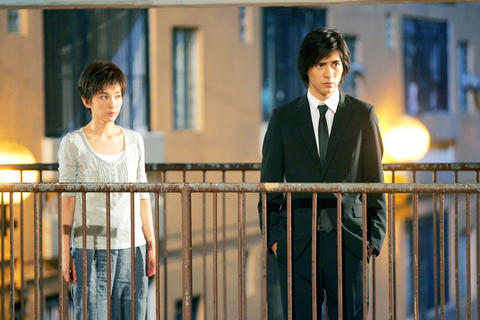Johnnie To's (杜琪峰) films are always highly anticipated and well received. Gangster movies like The Mission (鎗火), PTU and Election (黑社會) earned him the status of a world-class director. In light of that, his latest work, Linger (蝴蝶飛), may catch his fans by surprise as the director swerves into romantic territory. Taiwanese heartthrob Vic Chou (周渝民) of boy band F4 fame and China's Li Bingbing (李冰冰) turn in competent performances in this tale of love, loss, regret and rebirth.
The film begins with Dong (Vic Chou) dying in a car accident during a quarrel with his college sweetheart, Yan (Li Bingbing). The tragedy leaves Yan a psychological wreck who is barely able to cope, even with the help of Prozac.
Three years pass and when Yan's psychologist suggests that she comes off the medication, Dong's ghost appears, full of anger and regret over his death. At first confused and laden with guilt, Yan begins to pick up the bits and pieces of Dong's past: The life of a child growing up in a dysfunctional single-parent family.

PHOTO: COURTESY OF GROUP POWER ENTERTAINMENT
It hardly need be said that the two reconcile and love rekindles, but there is something other than love for Yan that keeps Dong's spirit lingering in the mortal world.
Keeping his promise to celebrated playwright Ivy Ho (岸西), of Comrades, Almost a Love Story (甜蜜蜜) and Divergence (三岔口) fame, To, who is known for shooting films without complete scripts, sticks to Ho's original composition, including feminine perspectives. The end result is a departure from To's sharp and pungent vocabulary to a style that is mild and sensitive.
The film is well cast. Taiwan's Chou succeeds in his silver screen debut, coming off as a lovable Prince Charming with a troubled past. Seasoned Chinese actor Yong presents a few good tear-jerking moments in the film as a father who has deep regrets. Leading lady Li also lives up to expectations by bringing out the dramatic and psychological intensity required for her role.
Though Linger is a romance flick through and through, audiences should expect more than the usual slobbery story about a lost lover. In To's romance, love goes hand-in-hand with unresolved anger, guilt and forgiveness and is open to the oscillations of genuine human emotions. The father-and-son relationship, though a side story, adds dramatic tension to the film in a way that touches the heart.
A love story told through seamless transitions and editing that threads through the present and past, underworld and mortal realm, Linger is as unexpected as it is charming.

Towering high above Taiwan’s capital city at 508 meters, Taipei 101 dominates the skyline. The earthquake-proof skyscraper of steel and glass has captured the imagination of professional rock climber Alex Honnold for more than a decade. Tomorrow morning, he will climb it in his signature free solo style — without ropes or protective equipment. And Netflix will broadcast it — live. The event’s announcement has drawn both excitement and trepidation, as well as some concerns over the ethical implications of attempting such a high-risk endeavor on live broadcast. Many have questioned Honnold’s desire to continues his free-solo climbs now that he’s a

As Taiwan’s second most populous city, Taichung looms large in the electoral map. Taiwanese political commentators describe it — along with neighboring Changhua County — as Taiwan’s “swing states” (搖擺州), which is a curious direct borrowing from American election terminology. In the early post-Martial Law era, Taichung was referred to as a “desert of democracy” because while the Democratic Progressive Party (DPP) was winning elections in the north and south, Taichung remained staunchly loyal to the Chinese Nationalist Party (KMT). That changed over time, but in both Changhua and Taichung, the DPP still suffers from a “one-term curse,” with the

Jan. 26 to Feb. 1 Nearly 90 years after it was last recorded, the Basay language was taught in a classroom for the first time in September last year. Over the following three months, students learned its sounds along with the customs and folktales of the Ketagalan people, who once spoke it across northern Taiwan. Although each Ketagalan settlement had its own language, Basay functioned as a common trade language. By the late 19th century, it had largely fallen out of daily use as speakers shifted to Hoklo (commonly known as Taiwanese), surviving only in fragments remembered by the elderly. In

William Liu (劉家君) moved to Kaohsiung from Nantou to live with his boyfriend Reg Hong (洪嘉佑). “In Nantou, people do not support gay rights at all and never even talk about it. Living here made me optimistic and made me realize how much I can express myself,” Liu tells the Taipei Times. Hong and his friend Cony Hsieh (謝昀希) are both active in several LGBT groups and organizations in Kaohsiung. They were among the people behind the city’s 16th Pride event in November last year, which gathered over 35,000 people. Along with others, they clearly see Kaohsiung as the nexus of LGBT rights.